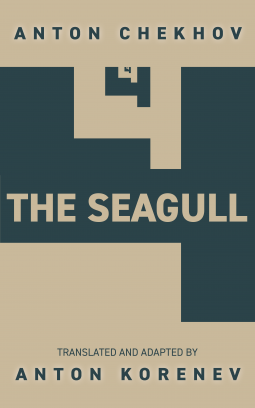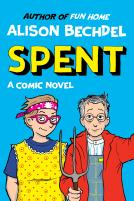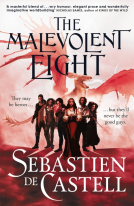
The Seagull
Translated and Adapted by Anton Korenev
by Anton Chekhov, Anton Korenev
This title was previously available on NetGalley and is now archived.
Send NetGalley books directly to your Kindle or Kindle app
1
To read on a Kindle or Kindle app, please add kindle@netgalley.com as an approved email address to receive files in your Amazon account. Click here for step-by-step instructions.
2
Also find your Kindle email address within your Amazon account, and enter it here.
Pub Date Aug 24 2021 | Archive Date Apr 30 2021
Description
What can we learn about love and life from one of the greatest plays of all time written by one of the greatest writers of all time, who also happened to define modern theater as we know it?
“…Many conversations about literature, little action, and five poods [181 pounds] of love.” That is how Anton Chekhov described his comedy, in which Medvedenko loves Masha, Masha loves Treplev, Treplev loves Nina, and Nina loves Trigorin, all while Shamrayev loves Polina Andreyevna, Polina Andreyevna loves Dorn, Dorn loves Arkadina, and Arkadina loves Trigorin. The situation becomes less comedic for a short period of time when two of these characters fall in love with each other, but “the circumstances have unexpectedly made it so that” this arcadia doesn’t last too long. There is little action in the play, other than the characters living their lives: some suffering from the creative process, some searching for fame, some desperately trying to live, some constantly attempting to end their life, all while new art forms are struggling to co-exist with the old… and—did we forget?—everyone is looking for love…
Translated by a Russian director and actor, this dramatic translation is deeply rooted in insights from his ongoing work on his own theatrical production as director and on the character of Trigorin as actor. Many textual and visual elements and clues that are essential to the story and character interpretation are presented in the English language for the first time. The book will include online access to additional materials, including the translator and director’s selected notes as well as audio and video resources.
Ч, the service and trade mark that we use for The Seagull-related endeavors, is both a letter in the Russian alphabet and a number.
The letter, pronounced as [ch] or [tch], is the first letter of the following relevant words in Russian:
• the playwright’s family name
• the play’s name [cháika]
• the family name of the composer Pyotr Tchaikovsky, a contemporary and friend of Chekhov, whose music is used extensively in the theatrical production
• the word for the number four [chetýre]
The number symbolizes:
• the four acts
• the four seasons corresponding to each of the four acts
• the four characters, whose lives intertwine the most
Names: Chekhov, Anton Pavlovich, 1860-1904, author. | Korenev, Anton Sergeyevich, 1977-, author.
Title: The seagull : translated and adapted by Anton Korenev / Anton Chekhov.
Description: Knoxville, TN: Anton Korenev Entertainment, 2021.
Identifiers: LCCN: 2020946434 | ISBN: 978-1-953608-00-0 (Hardcover) | 978-1-953608-01-7 (pbk.)
Subjects: LCSH Chekhov, Anton Pavlovich, 1860-1904--Translations into English. | Comedies. | BISAC DRAMA / Russian & Former Soviet Union | FICTION / Classics
Classification: LCC PG3456.C5 .K67 2021 | DDC 891.72/3--dc23
Price
Hardcover $29.95/£23.95/€25.95 (978-1-953608-00-0)
Paperback $19.95/£15.95/€17.95 (978-1-953608-01-7)
Ebook $9.99/Varies
Audio $29.95/£23.95/€25.95
Advance Praise
"A crisp, conversational translation that makes Chekhov’s words sing."—Kirkus Reviews
"A new translation of Chekhov’s The Seagull pulses with an artist’s sensitivity... A nuanced, aching Seagull, attentive to the rhythms and melody of Chekhov’s own language, but unfussily direct in its English."—BookLife Reviews, Editor's Pick
"Anton Korenev’s refreshing translation of Anton Chekhov’s The Seagull reveals the heart of the nineteenth-century story to a modern audience."—Foreword Clarion Reviews, Five-star Review
"Literature readers and drama students alike will appreciate the details and care that have gone into this translation, and will find that it stands out as a solid piece of literary research, language interpretation, and drama that, more so than many, captures the intention, nuances, and feel of Chekhov's writing."—D. Donovan, Senior Reviewer, Midwest Book Review
Available Editions
| ISBN | 9781953608000 |
| PRICE | |
Featured Reviews
 Paul S, Reviewer
Paul S, Reviewer
I have never been interested in any works by Chekhov but I though I would read this to broaden my knowledge and I have to say I am quite impressed by this adaptation, I am not going to rush out and buy all his works but it has engendered a desire to know more
The Seagull by Anton Chekhov
Human nature at it’s finest.
I must admit before we get started is my knowledge of Russian literature is very minimal. As well as just plays in general, this was my first time reading a play and I have to say I loved it!
Chekhov’s portrayal of human nature in this play shows. Each character is dealing with some sort of self resentment towards themselves in one way or another, some envious or jealous of others. But what he excels at is showing people’s underlying sadness. These characters although unhappy handle it in a way most people do in real life and that’s by hiding it or just completely blowing up the situation they are in.
This work by Chekhov is filled with lots of really complicated situations. Characters falling in love with the wrong people. Resulting in messy relationships with other characters because of their feelings.
Overall I enjoyed reading this work by Chekhov. It's going to deserve a reread right away! The way he just portrays his characters in these very emotional situations just had me hooked and I want to check out some of his other stuff here soon.
“Disclaimer this ARC was given to me by Netgalley and New Directions Publishing in exchange for an honest review”
This is my first time reading Anton Chekhov. That’s an embarrassing admission since I spent a semester studying plays and playwrights during my undergraduate degree and I love reading (and watching) plays.
Chekhov’s newest publication of The Seagull is translated by Anton Korenev. In the preface, Korenev takes on the responsibility of making “the production accessible to the English-speaking audience [. . .] Using the early modern Russian language that Chekhov himself used at the end of the nineteenth century” which “makes it possible to reproduce the sounds, melody, and poetics of the spoken language” (ix). And Korenev’s translation does indeed do that. It’s melodious. He captures the lyricism of the emotionally-charged play. The passion—or lack thereof—that the characters express for life, the craft of their art, and one another is clear in the language in this translation.
Since I haven’t read another translated version of The Seagull and don’t understand Russian, it’s impossible for me to compare Korenev’s rendition to previous translations or the original text. However, Korenev’s version was engrossing, and I couldn’t put my e-reader down. There were moments when I found myself laughing out loud and also feel my heart breaking. I don’t know what was more devastating, witnessing the pain the characters experienced due to unrequited love or the frustration that artists Irina, Nina, Treplev and Trigorin felt for various reasons.
I personally loved how Chekhov’s metaplay focuses heavily on the cultural relevance of art—especially to people’s identities. Since I studied literature, I can attest to understanding the instances where some characters felt like they were drowning in their art (the creative process) and when others felt completely disconnected from it as well. Chekhov’s play shows the complex emotions and relationships that artists experience with the creative process. Through Dorn, readers (or audience members) are reminded of the significance of aesthetic: “You took a subject from the field of abstract ideas. And that was the right thing to do, since literary work should undoubtedly express a grand thought. Only that which is deep is beautiful” (The Seagull, Act 1).
I also loved that Nina’ character confesses that she struggles to understand whether or not the seagull is symbolic! I’ve felt this way many times in school wondering how I was accepted into university in the first place! Nina says to Treplev, “You’ve been irritated lately, you keep expressing your unclearly, with symbols. And this seagull is probably a symbol, but forgive me, I don’t understand” (The Seagull, Act 2). Although this was a laugh-out-loud moment as I could sense the cheekiness, my younger self likely would have nodded in agreement with Nina.
But please don’t take my word for it that you should read Korenev’s translation of The Seagull. Just read it! This is a must-read for fans of Chekhov, plays, art, philosophical questions, romance or tragi-comedies.
Many thanks to Anton Korenev Entertainment and NetGalley for this ARC!
 Ness C, Reviewer
Ness C, Reviewer
I have read several translations of The Seagull by Anton Chekhov and some are turgid, old-fashioned or don't capture the humour of the play. This translation by Anton Korenev is clear and is tightly drafted so there aren't any sections that sag. The humour is there - though be warned that in typical Russian style it's a tragi-comedy! - and the love in all its forms comes through. Everyone despairs of the meaning of life and love over vodka while the seasons change and life carries on. Andrew Upton (Mr Cate Blanchett) updated and translated Uncle Vanya to be understood by an audience of the 2000's and this does so similarly - we still get the poetry of the language but it feels very current.
I will be recommending this translation to others interested in Chekhov's work.
Many thanks to NetGalley, the publisher and Anton Korenev for a copy of this ARC in exchange for an honest review.
This was a quick, fun read. As a longtime fan of classic Russian lit, and especially Chekhov, I found this translation very enjoyable. Korenev has managed to capture Chekhov's comedic tone, as opposed to most popular translations of The Seagull today, which paint the play as a tragedy, unlike Chekhov's original intention. Korenev gives enough stage direction to render the play understandable even in text format, although it should be said that The Seagull is definitely best—and much easier to follow—viewed live. The translation doesn't try to "Americanize" the original Russian naming conventions either, and retains the various different names for each character, instead providing a character list at the beginning for reference. Would have loved to see this acted out as Korenev had originally intended, but overall, a great refresh of an old classic.
 Silvia P, Reviewer
Silvia P, Reviewer
I had a vague idea of Chekhov after reading some of his short stories. Like his story this play has upper middle class characters, witty conversations and sarcasm. Even if you cannot empathize with any one of them, the play is still readable more than 100 years since its publishing date. The adaptation seemed ok even if I don't know any Russian so I couldn't compare to the original.
Anton Korenev’s new adaptation of Anton Chekhov’s The Seagull is a stark, succinctly Russian view of life, his translation getting right to the nitty-gritty without losing the poetry of the original. Of course, as an English speaker, I’ve only read a plethora of translations so can only assume what Chekhov’s original is like, but a Russian himself, my bet is that Korenev gets pretty dang close. And I have to say it is definitely my favorite translation so far.
The story of Konstanstin Treplev and his love, Nina, and his mother, Arkadina, and both of their loves, Trigorin, is a flurry of emotions and despair, no middle ground between the highest of highs and the lowest of lows. Taking place over a few years, each act is its own dramaful piece of Russian theatre. No one loves the person they’re supposed to and each life spirals as the characters attempt to move on in their lives despite this sad fact. Everyone is miserable while pretending to be happy. Arkadina chases her youth, Konstantin chases Nina, and Nina chases her dreams of being a famous actress, but loses herself along the way.
No one gets what they want.
It’s a beautiful tragedy.
Korenev’s translation gets right to the heart of the matter, skipping over most stage directions (which often take away from the story while reading a play) and jumping right to the poignant dialogue. Nina’s famous “seagull” monologue strikes right at the heart, the familiar lines fresh with new life in this adaptation.
As an eternal fan of Chekhov, I know my rating could be considered a bit biased but I don’t care. Chekhov’s melancholic writing isn’t for all readers but he is nevertheless a staple of theatrical history, and this adaptation is precise, poetic, and a perfect example of good Russian theatre. Coming from this all-American actor obsessed with the classics, that is the highest praise I can give for a new look at my favorite Russian play.
Trigger warning: self-harm, attempted suicide.
Thank you NetGalley and Anton Korenev Entertainment for providing me with an ARC of The Seagull in exchange for an honest review. All opinions are my own.
The Gist
It has been so long since I last read a play. Now that I’m thinking about it, it must be at least ten years. Probably even longer, since I finished my minor in Drama before 2010. Time certainly flies.
Before I started reading The Seagull, I was sure I had heard of the title before. Unfortunately, I just never had the opportunity to read it.
I had a difficult time getting fully immersed in the story, because I was only able to view the file through the NetGalley app on my phone.
Notoriously bad at reading on my phone, I kept forgetting I hadn’t finished it. I know, I’m probably an anomaly. When I did sit down to read for a few minutes, I had trouble adjusting the font and screen dimensions. I lost the page I had been on frequently.
It was a little off-putting.
The Details
The Seagull has a lot of characters. Together with the screen troubles I had, this turned out to become a challenging time keeping track of who is who.
Once I got my bearings a bit, the play turned out to be very entertaining. I enjoyed the characters and hearing about their struggles and problems, real or imagined.
The many interwoven love interests were quite funny. And the amount of subtext that was included in the dialogue provides enough material for long discussions of the philosophical nature.
I liked the time jump and I was very surprised by the ending.
The Verdict
Overall, I rather enjoyed The Seagull. It was different from the plays I had to read back during my undergrad years, and I appreciated the way the author chose to end it.
I would recommend it.
 Eleanor K, Reviewer
Eleanor K, Reviewer
This is a new translation of Chekhov's The Seagull . I'd never read The Seagull before but I was very impressed. It's a tale of thwarted ambition, heartbreak and betrayal and is rightly considered one of Chekhov's great works. It reads like a good translation with no awkward or stilted language.
Anton Korenev’s preparation for the production of Chekhov’s The Seagull was nearly complete when Covid shut down the theaters of New York City. He knew that the play would be performed in Russian and would require English subtitles; therefore, he used the year of isolation to research and translate the script. The result is so much more than a souvenir or an expanded playbill. It is a fresh, impactful, immediate version of the work in its own right.
Comparing this text to Marian Fell’s long-standing translation (available in the public domain), one can immediately sense Korenev’s pared-down, formal adherence to the Russian. It is not as concerned about a smooth landing on an English ear as it is about conveying the meaning of the lines alongside the fully immersed experience of the actors, the stage performance, and the music, all in 19th century Russian. The result for a reader is, arguably, what a written play should be: an enticing skeleton of a living, breathing event. In this case, it is a production that I now very much would like to see.
Thank you to Anton Korenev Entertainment and NetGalley for an Advance Reader Copy in exchange for an honest review.


















